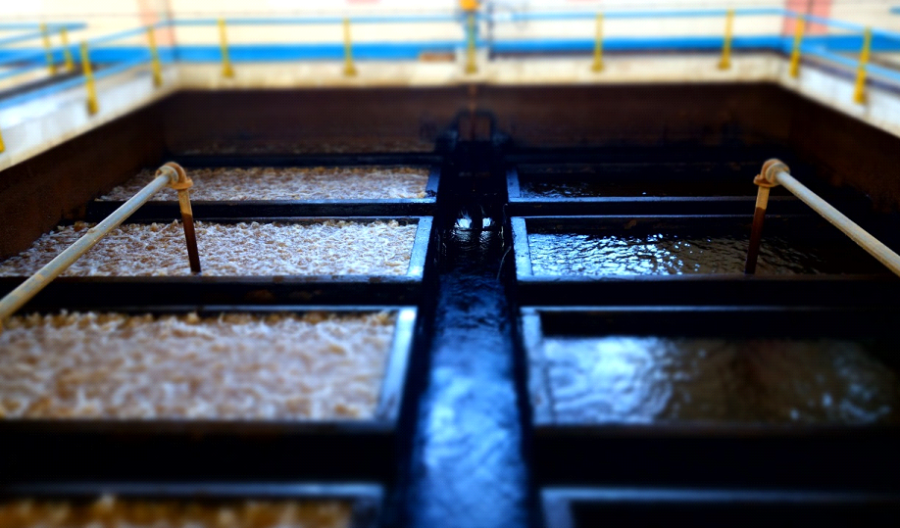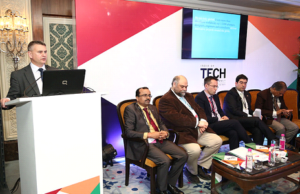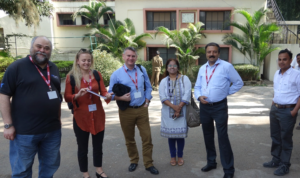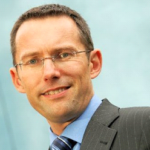15th December 2016 New Delhi, India
UK-India collaboration on waste water management

Dr Richard Allan, Head of the Centre of Expertise for Waters at the James Hutton Institute was invited by the Science and Innovation Network (SIN) India in November this year. He along with Dr Stephen Perry from the Hydro Industries and Martin Shouler from Arup were helping us with identifying potential opportunities of joint UK-India collaborative activities in handling waste water management in the Indian cities. Availability of water to meet rapidly growing urban demands will critically depend on implementing cost effective, sustainable innovative solutions that would help chart a better future for India’s urban areas. There is an increasing requirement that India adopts the best international practices to improve water use efficiency.
 We arranged several interactions for these delegates through participation in a panel discussion in the recently concluded UK-India Tech Summit, meetings with relevant academics from India’s top engineering institutes, IIT Delhi and IIT Bombay and interaction with Municipal Corporations of Pune and Mumbai. This three cities tour helped the delegates with understanding the challenges as faced in these cities as well as opportunities for joint partnership in handling this significant challenge.
We arranged several interactions for these delegates through participation in a panel discussion in the recently concluded UK-India Tech Summit, meetings with relevant academics from India’s top engineering institutes, IIT Delhi and IIT Bombay and interaction with Municipal Corporations of Pune and Mumbai. This three cities tour helped the delegates with understanding the challenges as faced in these cities as well as opportunities for joint partnership in handling this significant challenge.

I was very privileged to be asked to attend the prestigious India-UK Tech Summit between the 7-9th of November followed by a trade mission to New Delhi, Pune and Mumbai. The purpose of the trip was to explore opportunities to develop innovations in smart cities and water sustainability. During the India-UK Tech Summit we heard from the UK and India Prime Ministers on the importance of working together in partnership and seeking opportunities to deliver innovation and commercial success that benefits society. We also heard from a range of business leaders who shared their experiences in developing solutions to some of the most critical global challenges such as water security and safe sanitation which supports the sustainable development goal 6. It was recognised that water is at the heart of everything we do and is critical in supporting growth in the economy and expanding urbanisation at a time when fresh water resources are under pressure from factors such as climate change, domestic consumption, industrial use and agriculture. It was great to hear that work is underway to address water security and this needs full cooperation between government, academia and the private sector to deliver the required transformative innovations.
During the second part of the trade mission the UK team were delighted to meet leading academics at IIT New Delhi and Mumbai who discussed priorities for research in drinking water and safe sanitation with a focus on water security, water quality issues and smart cities. The work of the research groups was very impressive. The UK team also had the pleasure of facilitating a round table workshop in Pune where we identified a range of challenges that included:
- Improving public engagement on the subject of water security
- Increasing activities around water conservation and reuse
- Supply of water that is of an appropriate standard for use
- Capacity building
- A move to zero water discharge – closing the loop
- Integrated water planning
- Access to safe sanitation
- Affordability and willingness to pay
These challenges will form the backbone of strategic thinking as we move to a more sustainable way of managing precious water resources globally.
Finally the team visited the Municipal Corporation of Greater Mumbai where we had a great discussion about the progressive plans to invest significantly in the urban wastewater treatment systems and build robust infrastructure that supports growth within the city.
Thanks must go to the generosity of our hosts in each city and for the fantastic support we received on out visit from the British High Commission Staff, it really was greatly appreciated.

Hi Richard & Swati,
An excellent write-up of our visit to the Tech Summit last year. Hope you, the other UK delegates and our gracious Indian hosts are all well !
Best Regards,
Stephen.
Congratulations for opportunities! Great work!